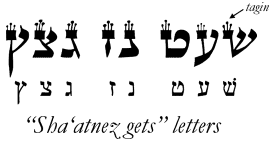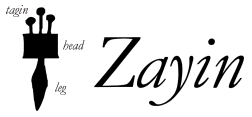|
The letter Zayin is the seventh letter of the Aleph-Bet, having the numeric value of seven. The pictograph for Zayin looks like a sword, whereas the classical Hebrew script is constructed of a Vav with a large "crown" on its head:

- The Mystery of Zayin
Zayin is considered a "crowned" Vav. Just as Vav represents "yashar," straight light from God to man, so Zayin represents  (or chozer), or returning light. The Besht (Baal Shem Tov) said that just as a woman of valor is the crown of her husband, so Zayin, the 7th letter, is the crown of Vav. (or chozer), or returning light. The Besht (Baal Shem Tov) said that just as a woman of valor is the crown of her husband, so Zayin, the 7th letter, is the crown of Vav.
- The Gematria of Zayin
The gematria of the word Zayin is 67, which is the same value for  (binah), meaning understanding. (binah), meaning understanding.
- The Meaning of Zayin
Zayin is a paradoxical word, since it means "weapon" or "sword," but derives from a root word that means "sustenance" or "nourishment." The root (zan) appears in words like  (mazon), meaning "food." But how is food or nourishment related to the sword? (mazon), meaning "food." But how is food or nourishment related to the sword?
Notice that the word for bread, lechem, is contained in the Hebrew word for war, milchamah:

The sword of war is often needed for our nourishment, not in the sense (of course) of vindictive fighting that is based on lust or avarice, but in the spiritual sense that in order to be nourished and at rest we must sometimes engage in warfare.
- Zayin, Seven, and the Sword of Time
Since Zayin represents both the number 7 and a sword, it is not surprising that it is used to divide or "cut up" time  (z'man) into units of sevens: (z'man) into units of sevens:
- Shabbat - the 7th day of the 7-day week (the week of days)
- Shavu'ot - the 49th day after Passover (the week of weeks)
- Tishri - the 7th month of the year (the week of months)
- Shemitah - the 7th year of rest for the land (the week of years)
- Yovel - the 49th year (the week of weeks of years)
- The Millennial Kingdom - the 7th millennium of human history (week of 1,000s)

"All sevens are blessed" (Vayikra Rabbah 29:10), and the number seven has always been regarded in the Jewish tradition as the number of completion, wholeness, blessing, and rest.
- Zayin and Remembrance
The word time (zman) in Hebrew begins with Zayin, as does the word zacher (remember) and zicharon (remembrance). The memory of the time is the basis for self-identity and purpose in God's creation.
Remember the days of old (Deut. 32:7):

Remember the Sabbath day to keep it holy (Ex. 20:8):

The memory of the righteous is a blessing (Avot):

- The Oversized Zayin
An oversized Zayin is found in Malachi 4:4:

"Remember the Torah of Moses my servant that I commanded him at Horeb, the statutes (chukim) and judgments (mishpatim) for all Israel."
Since Zayin represents a weapon of the Spirit, remembering the Torah of Moses is here depicted as a great weapon to be used in spiritual warfare in our lives.
- Zayin and Crownlets
The letter Zayin does not appear in Psalm 91, despite the fact that this is a warfare psalm that is often used in deliverances. Why is that?

Eight Hebrew letters are given special adornment by attaching three "tagin" or crownlets to them (collectively these letters are sometimes called "sha'atnezgets" letters). Some of the sages have said that these crownlets are actually small "zaynin" so that, for example, when Psalm 91 is recited, they function as spiritual weapons.
Note: There is midrash (Babylonian Talmud Men. 29b) in which God is seen putting crowns on top of the Hebrew letters of the Torah, and Moses asks the Him what they mean. The LORD responds that a man named Rabbi Akiva will ornament (through interpretation) thousands of halakhot (religious rulings) from these crownlets.
- Zayin is the Crowned Man (Jesus) equipped with the sword of the Holy Spirit
Since Vav represents man and Zayin is the crowned Vav (i.e., the Crowned Man), we can also see that the Zayin represents Jesus the Messiah, the true King of the Jews. And since Zayin also represents a sword, we see the Man Jesus equipped with the sword of the Holy Spirit.

Note: The sword mentioned in Hebrews 4:12 is  (machaira), a "short sword" that was sharpened on both edges of the blade. The two edges represent the two main parts of the Scriptures (the old and new testaments). (machaira), a "short sword" that was sharpened on both edges of the blade. The two edges represent the two main parts of the Scriptures (the old and new testaments).
- Zayin is a Picture of Jesus the Messiah
Since Zayin represents the crowned Man, we would expect it to reveal other truth about Jesus as the King of the Jews. Indeed, since Zayin's sword represents our Protector, as Jesus is the "Lion of the tribe of Judah"; and since Zayin also represents nourishment life, Jesus is here depicted as the Shepherd who feeds His sheep.
- Crowned Letters
In some Torah Scrolls, eight Hebrew letters are given special adornment by attaching three "tagin" or crownlets to them. Collectively these letters are sometimes called "sha'atnezgets" letters (for Shin, Ayin, Tet, Nun, Zayin, Gimmel, and Tsade).
Midrash ascribes the origin of the tagin as part of mattan Torah - the giving of the Torah at Sinai. The Talmud describes Moses wondering about why God was affixing these embellishments to certain letters of the Torah:
"When Moses went up to God, he found God sitting and putting little crowns on the top of the letters of the Law. He said to God, 'Who is it that forces You to put crowns to the letters of the Law [which You have already written]? He replied, 'A man is to appear on earth after many generations, Akiba b. Joseph by name, who will expound for each top of every letter of the Law heaps and heaps of rulings'...." Talmud (Menachot 29b)

Some people have wondered if these crownlets are the "tittles" referred to by Jesus in Matthew 5:18, although it is unclear that the tagin were in use at that time. It is more likely that the "tittle" refers to the "kots" or "thorn" that projects from a letter.
|













